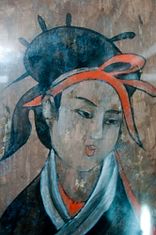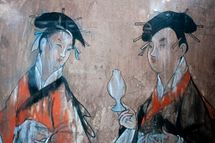Han Emperor Ling
| Full name |
|
|
| Era dates |
- Jianning (建寧) 168–172
- Xiping (熹平) 172–178
- Guanghe (光和) 178–184
- Zhongping (中平) 184–189
|
| Posthumous name |
| Xiaoling (孝靈) |
| Murals of the Dahuting Tomb (Chinese: 打虎亭汉墓, Pinyin: Dahuting Han mu) of the late Eastern Han Dynasty (25-220 AD), located in Zhengzhou, Henan province, China, showing scenes of daily life. |
|
|
A woman with an Eastern Han hairstyle
|
|
Detail of a banquet scene
|
Women dressed in Hanfu robes |
|
Emperor Ling of Han (156 – 13 May 189), personal name Liu Hong, was the 12th emperor of the Eastern Han dynasty. Born the son of a lesser marquis who descended directly from Emperor Zhang (the third Eastern Han emperor), Liu Hong was chosen to be emperor in in 168 around age 12 after the death of his predecessor, Emperor Huan, who had no son to succeed him. He reigned for about 21 years until his death in 189.
Emperor Ling's reign saw another repetition of corrupt eunuchs dominating the Han central government, as was the case during his predecessor's reign. Zhang Rang, the leader of the eunuch faction, managed to dominate the political scene after defeating a faction led by Empress Dowager Dou's father, Dou Wu, and the Confucian scholar-official Chen Fan in 168. After reaching adulthood, Emperor Ling was not interested in state affairs and preferred to indulge in women and a decadent lifestyle. At the same time, corrupt officials in the Han government levied heavy taxes on the peasants. He exacerbated the situation by introducing a practice of selling political offices for money; this practice severely damaged the Han civil service system and led to widespread corruption. Mounting grievances against the Han government led to the outbreak of the peasant-led Yellow Turban Rebellion in 184.
Emperor Ling's reign left the Eastern Han dynasty weak and on the verge of collapse. After his death, the Han Empire disintegrated in chaos for the subsequent decades as various regional warlords fought for power and dominance. (See End of the Han dynasty.) The Han dynasty ended in 220 when Emperor Ling's son, Emperor Xian, abdicated his throne – an event leading to the start of the Three Kingdoms period in China.
Liu Hong was a hereditary marquis – the Marquis of Jiedu Village (解瀆亭侯). In the Han dynasty, a village marquis's marquisate usually comprised only one village or, in rarer cases, two or three villages. He was the third person in his family to hold this title; his father Liu Chang (劉萇) and grandfather Liu Shu (劉淑) were also formerly Marquis of Jiedu Village. His great-grandfather, Liu Kai (劉開), the Prince of Hejian (河間王), was the sixth son of Emperor Zhang, the third emperor of the Eastern Han dynasty. His mother, Lady Dong, was Liu Chang's formal spouse.
...
Wikipedia




